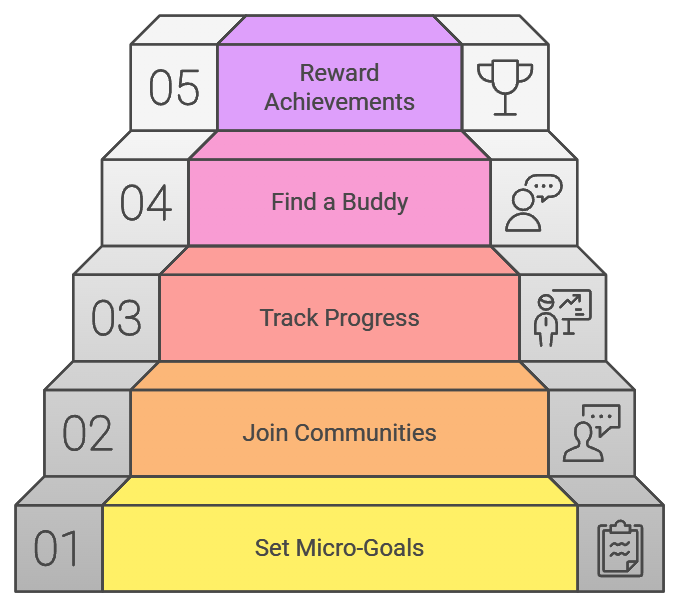How to Learn French in 2 Years: A Science-Based Complete Guide
Learning French in two years is absolutely achievable with the right approach, dedication, and smart learning strategies. By combining modern technology, neuroscience-based techniques, and structured practice, you can reach fluency in French within 24 months, even starting from zero.
Key Takeaways
- Dedicate 1-2 hours daily for consistent practice
- Combine traditional methods with AI-powered tools
- Focus on immersion and real-world application
- Track progress using CEFR guidelines
- Maintain motivation through community engagement
The Science Behind Language Learning
The human brain has an amazing ability to learn languages, even in adulthood. Recent neuroscience research shows that our brains create new neural pathways when learning a language, making it easier to absorb information over time. This process, called neuroplasticity, works best when we combine different learning methods.
Learning Efficiency Table
| Time of Day | Brain Activity | Best Learning Activity |
|---|---|---|
| Morning | High Focus | Grammar & Vocabulary |
| Afternoon | Creative Peak | Speaking & Writing |
| Evening | Relaxed State | Listening & Reading |
Memory Formation Tips:
- Study in 25-minute blocks with 5-minute breaks
- Review material before sleeping
- Mix different learning activities daily
- Use spaced repetition for vocabulary
Foundation Phase (Months 1-6)
The first six months are crucial for building a solid foundation. Start with basic grammar and high-frequency vocabulary. Modern apps like Duolingo and Babbel can help, but they shouldn’t be your only tools.
Essential Daily Activities
- 20 minutes of grammar practice
- 30 minutes of vocabulary building
- 15 minutes of pronunciation drills
- 20 minutes of listening practice
Technology-Enhanced Learning
Today’s language learners have advantages that weren’t available years ago. Virtual Reality (VR) platforms now offer immersive French experiences, while AI language partners provide 24/7 conversation practice.
Recommended Tools:
- VR platforms for virtual France tours
- AI conversation partners
- Podcast apps with transcripts
- Speech recognition software
Progress Tracking System
| Level | Timeline | Milestone Goals |
|---|---|---|
| A1 | Month 3 | Basic Conversations |
| A2 | Month 6 | Daily Situations |
| B1 | Month 12 | Complex Topics |
| B2 | Month 18 | Professional Use |
| C1 | Month 24 | Near-Native Fluency |
Psychological Success Factors
Many learners focus solely on language skills while neglecting the psychological aspects of language learning. Maintaining motivation and managing anxiety are crucial for long-term success.
Motivation Maintenance Strategies
- Set weekly micro-goals
- Join online French communities
- Track and celebrate progress
- Find a language learning buddy
- Reward yourself for achievements

Cultural Integration
Understanding French culture accelerates language learning. Watch French movies, listen to French music, and follow French social media accounts. This cultural immersion helps you think in French naturally.
Cultural Learning Activities:
- Follow French YouTubers
- Cook French recipes
- Read French news daily
- Participate in French forums
Advanced Progress Techniques
Once you reach the intermediate level, focus on:
Speaking Practice
- Join language exchange platforms
- Attend French conversation meetups
- Record and analyze your speech
- Practice with native speakers
Writing Skills
- Keep a daily journal in French
- Write social media posts in French
- Email French-speaking friends
- Participate in writing workshops
Neuroscience-Based Study Schedule
The brain learns best when we align our study schedule with natural cognitive rhythms:
Morning (Peak Focus):
- Grammar exercises
- Vocabulary memorization
- Writing practice
Afternoon (Creative Peak):
- Conversation practice
- Role-playing exercises
- Cultural activities
Evening (Relaxed State):
- Listening to French music
- Watching French movies
- Reading French books
Remember, consistency is more important than intensity. It’s better to study for 30 minutes every day than 5 hours once a week. Keep track of your progress, adjust your methods based on results, and stay connected with the French-learning community for support and motivation.
By following this comprehensive approach and maintaining consistent practice, you can achieve French fluency within two years. The key is to combine traditional learning methods with modern technology while keeping your brain’s natural learning patterns in mind.
